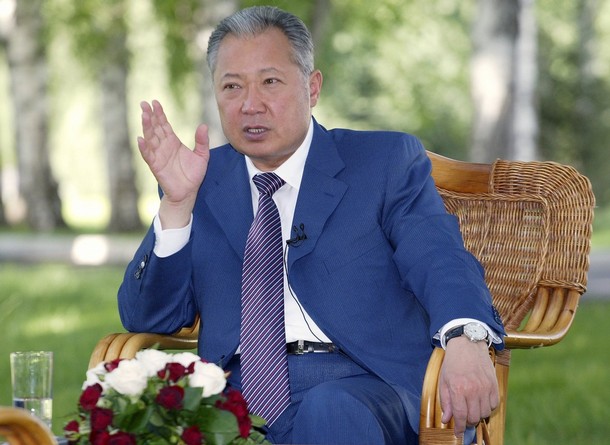
Bakiyev Benefits from Recent Foreign Policy Moves, Opposition’s Weakness
Publication: Eurasia Daily Monitor Volume: 6 Issue: 146
By:

Less than one week after the Kyrgyz presidential elections the Russian government confirmed its plans to open another military base in Kyrgyzstan. The base will be introduced in the country’s south, close to Uzbekistan and Tajikistan’s borders. Partly thanks to the new base deal, the recently re-elected president Kurmanbek Bakiyev quickly received Moscow’s recognition as the new president. His Central Asian partners also rushed to congratulate him on his latest victory (EDM, July 24). Opposition forces, however, are wasting their chances to oppose the regime.
Although Moscow plans to open a second military base in Kyrgyzstan aimed at establishing a greater military and political presence in the wider region, Bakiyev saw personal benefits from collaborating with his powerful neighbor. The president has continued to increase his regional and domestic leverage thanks to the U.S. military presence in Kyrgyzstan. Regionally, he secured support from Moscow. Domestically, he escaped criticism from the United States by first threatening to get rid of the U.S. base in February and then agreeing to retain it.
On July 29 Sergey Prihodko, an aide to Russian President Dmitry Medvedev, announced that both Russia and Kyrgyzstan have reached agreement on all aspects of the new military base (www.akipress.kg, July 29). According to Prihodko, however, the Osh base is a move under the Collective Security Treaty Organization (CSTO) aegis, as opposed to Russian-Kyrgyz bilateral relations. This formality presents the new base as the CSTO’s response to regional security threats and the organization’s search for the security of its member states. A more pragmatic interpretation of the Osh base among Kyrgyz NGO experts shows that it fulfills the CSTO’s plan to present Moscow as the main political force in Kyrgyzstan and the wider region.
Kyrgyzstan’s example demonstrates how the various international forces enhance local authoritarianism. The recent election showed that Bakiyev was able to avoid Western criticism, while also receiving strong support from Russia. It remains unclear how much actual financial aid Bakiyev personally receives from Russia, but that he can continue his rule unhampered despite strong opposition in the country encourages the regime to bargain with Russia and the United States. Moreover, observers from the Shanghai Cooperation Organization, in which China is also a member, have said that the elections were "clean" and the results were legitimate.
Furthermore, Bakiyev was able to use public anger over power shortages during the winters of 2007-2009 for his own purposes. Then, electricity shortages caused regular blackouts throughout the country. According to the official agreement achieved in February, the $1.7 billion loan allocated by Russia will be spent on the construction of Kambarata-1 hydropower station. The coming winter will show how Bakiyev is planning to handle the hydropower sector, if he is genuinely interested in improving it or if his government will pocket most of the loan. Shortly after receiving the loan, the Kyrgyz government began to actively report on the progress made in constructing the site. However, this reporting had faded by the summer.
Meanwhile, the Kyrgyz opposition has been persecuted by law-enforcement structures. The government banned unsanctioned protests in central Bishkek. At the July 29 protests organized by the opposition, law-enforcement agencies dispersed crowds, and dozens were arrested. Opposition candidate Almazbek Atambayev failed to gather enough support to oppose the election result. After the failed protests in Bishkek on July 29, Atambayev began moving his supporters towards the Issyk-Kul oblast. According to local observers, Atambayev was seeking to disturb the CSTO’s informal summit taking place in Cholpon Ata from July 31-August 1.
The split among the opposition leaders is partly as a result of its failure to challenge Bakiyev. The most prominent opposition leaders Omurbek Tekebayev and Bakytbek Beshimov represented direct competition to Atambayev. Both leaders are known for their political consistency and strong support base. Atambayev, however, proved to be incapable not only in bringing his own supporters to the after-election riots, but also in communicating effectively to the Kyrgyz public in general about how rigged elections should be opposed. Atambayev travelled to Moscow to present his vision of the recent election, further demonstrating his lack of understanding of the Bakiyev regime’s strength stemming from Russian support.
In the coming days Bakiyev will embark on the traditional reshuffling of the government cadres, though no new faces are expected to appear on the political scene. Bakiyev will be inaugurated on August 2. The opposition will continue to be suppressed by the government, while the Bakiyev regime prepares for preserving power in future elections.




